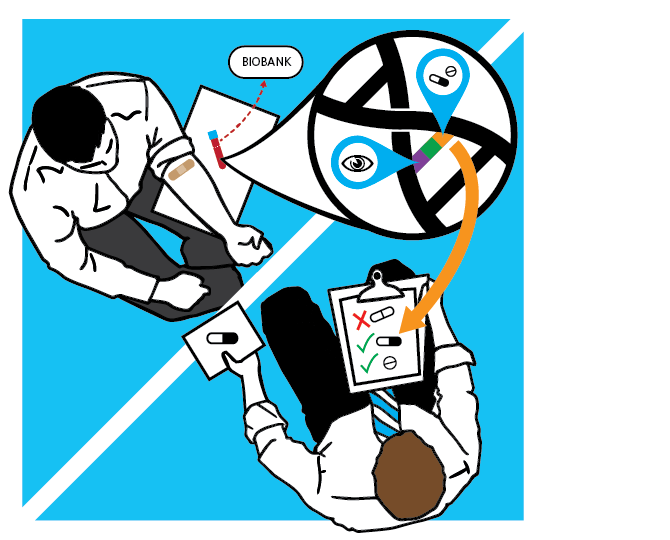How Similes Helped Communicate Complex Health Topics to Patients
By Courtney Moore, Senior Designer, Research Jam (Indiana CTSI’s Patient Engagement Core)
3 Minute Read

Informed consent is critical to medical research, but it is frequently challenging. It’s vital that patients understand what they’re signing up for when they agree to take part in a research study. Studies for specific conditions, like obesity, can be easier to communicate, but how do you ask people if they want to join a study about something called pharmacogenetics?
The INGENIOUS Study at Indiana University wanted to understand the effects of pharmacogenetics on clinical costs and health outcomes during treatment with some of the most commonly used medications. In order to do this, however, the team needed to accomplish three things during a clinic visit. Within a brief window of time, they needed to: 1) explain pharmacogenetics, 2) describe the study process, and 3) obtain informed consent. This proved to be a difficult challenge for INGENIOUS and their recruitment team at ResNet.
Research Jam, AKA Indiana CTSI’s Patient Engagement Core, teamed up with Kenneth Levy, Co-Investigator of the INGENIOUS team, and Jane French, ResNet coordinator, to find out how to best explain pharmacogenetics and the study purpose to patients. Ten adult patients participated, sharing their impressions of the INGENIOUS study and pharmacogenetics in general.
Asking patients what they think about something they’ve probably never heard of is obviously tricky. The first step was to help our collaborators understand the basics of pharmacogenetics. To accomplish this, the team developed a first draft of an infographic that showed the process of the study, which illustrated pharmacogenetics in practice. During the Jam, we asked our patient collaborators to explain what they thought was happening in the infographic in their own words. This helped us understand whether or not the infographic was communicating what we intended.
We then paused to explain what the infographic was meant to communicate and defined pharmacogenetics, and asked our collaborators to consider this new information. The patients were more accurate, but still unable to clearly and quickly explain pharmacogenetics.
Finally, we asked our collaborators to explain pharmacogenetics using a simile. Our session created the following similes.
Pharmacogenetics is like:
- Grocery Shopping – Pharmacogenetics is like going to the grocery store and picking that just-right green pepper just for you.
- Plumbing – You have to know what the cause of the clog is so you can pick the right thing, acid or liquid plumber.
- Working On A Car – Taking a fuel sample tells you what contaminants are in the fuel. This tells you what to use to clean it.
- Cooking – It’s like needing to know exactly what goes in the recipe. If you put something in that doesn’t belong, the taste comes out horrible.
- Shopping – If you go to pick out an outfit and don’t try on the clothes and just guess, it might not fit. So you’ll just have to go right back to the store.
- Fishing – There are all different kinds of fish in one lake. You can go all day trying to figure out what bait they are biting. If you knew before you started, you’d catch a fish quicker.
- Stepping/Line dancing – There are specific steps you must do to specific songs and you have to be on beat. You have to know what you’re doing.
- Maintenance – You’ve got to figure out what’s wrong before you can fix it.
All of these were great places to start in explaining not just pharmacogenetics, but the broader field of personalized medicine. While not all of the similes were universal experiences, we found two that we thought would help with the widest audience:
“Pharmacogenetics is kind of like being able to try on clothes before you buy them instead of crossing your fingers and hoping they fit.”
“Pharmacogenetics is kind of like knowing which bait is best for the fish you want to catch instead of trying bait after bait before you find the right one.”
These similes were used, along with other themes that emerged, to create two communication pieces: (1) a recruitment tool to aid research assistants in communicating to patients during recruitment and (2) a brochure about the study for patients to take home with them.
The ResNet team is now able to quickly educate patients on what pharmacogenetics is and the benefits of researching it further, making study recruitment easier and leaving the community with a greater understanding of the science of research.
